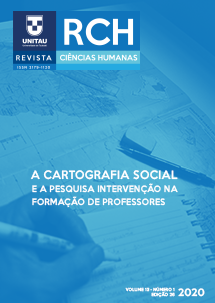RESEARCH-HERMENOLOGICAL PHENOMENOLOGICAL TRAINING "HEIDEGGERIANA":
(Auto) Cartographies of Teachers in Navigation to Self-care
DOI:
https://doi.org/10.32813/2179-1120.2020.v13.n1.a593Abstract
The objective of this theoretical-reflective article is to present and discuss some aspects of the "Heideggerian" Hermeneutic-Phenomenological Research, with a qualitative-implied methodological approach, which sought to emphasize its (self) cartographic pertinence in a training process on self-care. For this, it assumes a multireferential perspective (MACEDO, 2000), having in the "Heideggerian" thinking about self-care its focal point. In addition, the article adopts a metaphorical language related to navigation. It brings together contributions from Josso (2007), Longarezzi e Silva (2008), Barbier (2004), Boff (2014), Freire (2015), Bondía (2017), Gadamer (2002), Rogers , Souza and Francisco (2017) and Passos, Kastrup and Escóssia (2015). The navigational instruments, which mark and record paths, conditions and states, were called "(self) Cartography in formation: maps of oneself". These were: reflective journals, which contributed to the (self) reflection records; and the writings of self and practices, which served as a creative (ins) creative, involving practice as being-in-the-world. From this formative navigation, it is understood that the formative spaces are moments in which the crews-teachers have the possibility of experiencing the (auto) cartography, in the movement of revealing and covering itself, until it reveals itself, taking responsibility for the cultivation of their self-care. The (self) cartography by crew-teachers indicates that the training is really a place for self-care, affecting the encounter of self and the other, causing concern, restlessness and a sense of connection with their actions and those of the community.
Metrics
Downloads
Published
How to Cite
Issue
Section
License
Copyright (c) 2020 Human Sciences Journal - RCH

This work is licensed under a Creative Commons Attribution 4.0 International License.
The publications of the Human Sciences Journal are registered under the Creative Commons Attribution CC-BY license.
1. The contents of the manuscripts are the exclusive responsibility of their author.
2. It is allowed the total or partial reproduction of manuscripts published in the journal, provided that the source is cited.
3. When submitting their manuscript to the Journal, the authors certify that they are of their own authorship and unpublished (not published in any digital or printed media).
4. The copyright of the articles published in the Journal are of the author, with first publication rights reserved for this journal.
5. For disclosure purposes, the Journal may replicate the works published in this journal in other media, such as social networks (Facebook, Academia.Edu, etc.).
6. The Journal is of public access, therefore, the authors who submit manuscripts agree that they are of free use.
7. In case of any illegality, fraud, or other attitude that puts in doubt the honesty of the publication, especially the practice of plagiarism, the manuscript will be automatically rejected.
8. If the manuscript has already been published, it will be immediately removed from the base of the Journal, its citation linked to the Journal will be prohibited and the cancellation of the referred publication shall be reported in the next issue of the one in which the article was published. In case of the procedure for the withdrawal of the paper the authors will be informed beforehand, being guaranteed the right to a broad defense.
9. The personal data provided by the authors will be used exclusively for the services provided by this publication and will not be made available for other purposes or to third parties.





